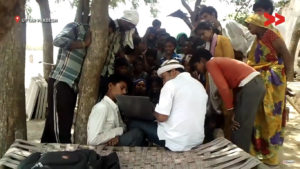In a drought-affected village in Uttar Pradesh, the community came together to solve systemic bureaucratic apathy and wrested the employment guaranteed under MGNREGA.
“The trouble is we have nothing to eat,” says Kunwar Bai, a resident of the drought hit Chhapchhal village in Uttar Pradesh. The Mahatma Gandhi National Rural Employment Guarantee Act (MGNREGA) was designed to support citizens like Kunwar Bai with 100 days of guaranteed paid employment in a year. However, 40 families enrolled in the scheme, belonging to the indigenous Rawat community, were not given work under the scheme. To make matters worse, it turns out that the last time Kunwar Bai was employed under the scheme, she was only paid for six days instead of the fourteen that she worked for.
The largest job creation program of its kind in the world, MGNREGA was given a budgetary allocation of Rupees 48,000 crore in 2017. Proponents argue that those historically marginalised and vulnerable are intended beneficiaries--women account for more than half of those employed, SCs and STs are also represented at higher rates than national averages.
However, for people like Kunwar Bai, who are reliant on daily wages, non-payment of dues--a frequently highlighted shortcoming of the MGNREGA--have serious consequences. Like Kunwar Bai, more than half of those enrolled in her district were not given work. Government data further reveals that only 22 percent of MGNREGA workers in the state were paid within the promised 15-day period compared to the national 40 percent mark. While the scheme promises 100 days of employment, MGNREGA labourers in Uttar Pradesh on an average received 32 days of work, compared to the national average of 46.
[caption id="attachment_15158" align="alignleft" width="300"] Shankarlal uses laptop to screen issue video in Chhapchhal[/caption]
Shankarlal uses laptop to screen issue video in Chhapchhal[/caption]
Community Correspondent Shankarlal Raikwar made a video about the issue to create awareness about the severity of distress induced by drought and the lack of work under MGNREGA. He screened the film managing to show it to 150 community members. In a subsequent meeting with 60 affected people, a collective decision was taken to give written application for work to the local block office. Their application was successful and 200 members received employment.
Experts have pointed out that one of the major drawbacks of the MGNREGA is its lack of a functioning grievance redressal mechanism. Marginalised citizens like Kunwar Bai slip through the gaps and the system is not designed to be responsive to their needs. It is the need of the hour to empower communities to effectively demand their rights and create a system of governance that is responsive to citizens’ needs. Community Correspondent Shankarlal Raikwar has shown the way. And we can only hope that his example is followed by many more community leaders.
Article by Abhishek Shah
The hopes of New Delhi Street Vendors
This video will give you a perspective from the street vendors point of view and the actual issues they are still facing in Delhi.
Highlights from the Video Volunteers Annual Report 2021-2022
In the year 2021-2022, Video Volunteers reached a huge number of people. Each video, on average, documented a problem, a ground reality that affected nearly 35,000 people. And we reported more than 1500 stories last year. Impacts achieved by our community correspondent have benefited 3.2 million people, in total.

